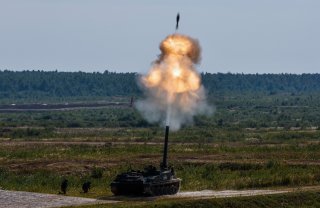Understanding the Ukraine War Through the Lens of World War II
The territory of eastern Ukraine over which Moscow and Kyiv are currently fighting was some of the most hotly contested of World War II.
The Russians have recently lost significant territory, exposed Putin’s folly for all to see, and in so doing, have disgraced the achievements of the Red Army that did the heavy lifting in Hitler’s defeat. Conversely, the Ukrainian counterattacks have earned the respect of much of the globe. By late spring Putin’s army had culminated, and after a couple of months to regroup, the Ukrainians moved out. The advances of Zelenskyy’s army have slowed lately, and it may culminate this autumn. That we cannot say for certain, but we do know that in this conflict there is much combat and many changes in momentum yet to come.
We do not need General Obvious to tell us that with the Russian Army’s constant atrophy of leadership, morale, and planning, Putin’s “special military operation” has degraded into his favored unskilled style of warfare, perfected in Syria and elsewhere: lobbing artillery at civilian targets from a safe distance. For its part, so long as it receives Western financial and military aid, we can expect Ukraine to make modest progress. Given that the West decided to limit itself to assisting Ukraine with “defensive” weapons only, small, episodic, and partial victories will probably remain the best “David” can do.
Much depends on Russia’s dwindling number of supporters and benevolent neutrals, especially Communist China. Western “Ukraine fatigue” looms as a constant threat. One possible outcome of this war is time-honored and rather simple: victory will go to the party that gets the upper hand in the race for resources and successful weapon systems. Meanwhile, operations will continue to roll back and forth over steppes that are no strangers to war.
Robert Kirchubel, LtCol US Army (Ret), Ph.D. is a military historian specializing in the Nazi-Soviet War. I wish to thank my FORCES colleague Dr. Sorin Adam Matei for his valuable comments.
Image: Reuters

